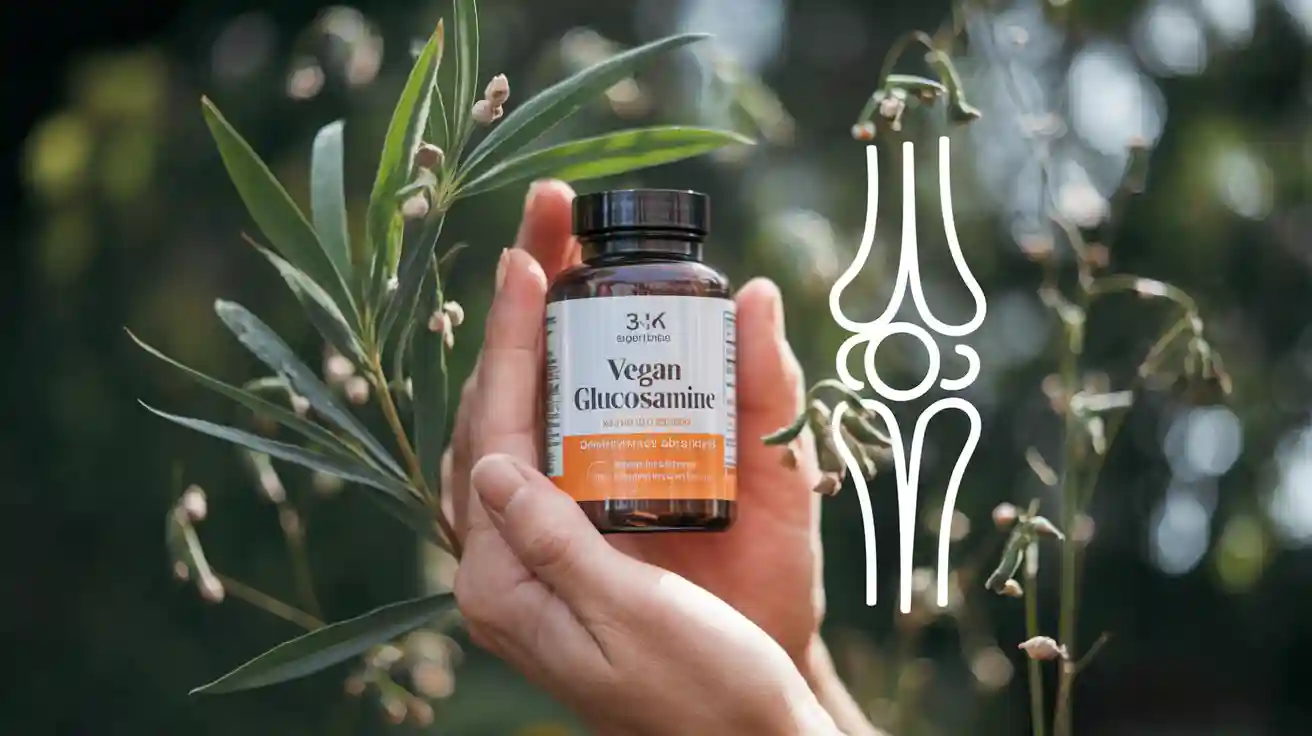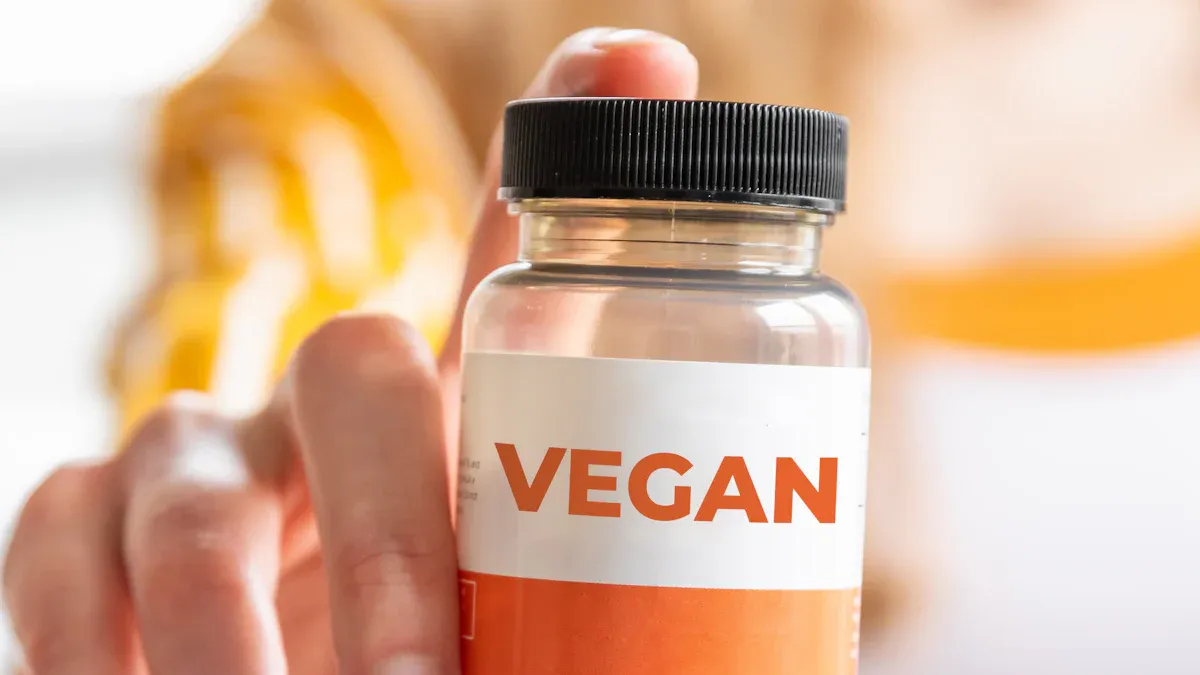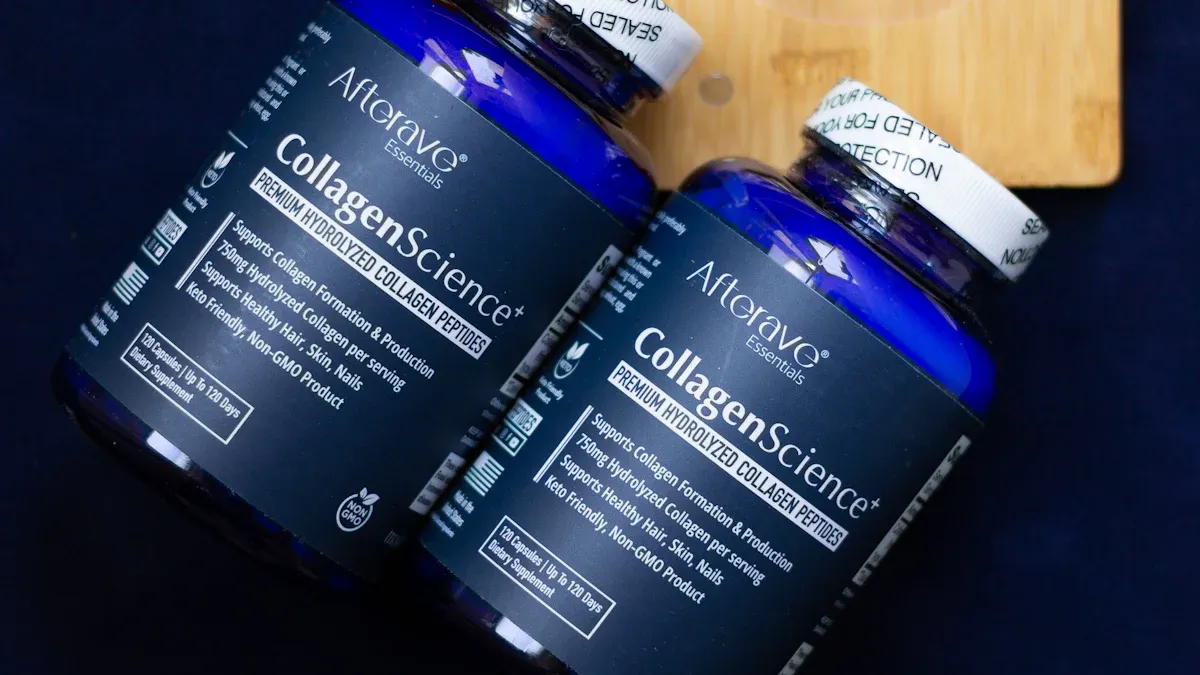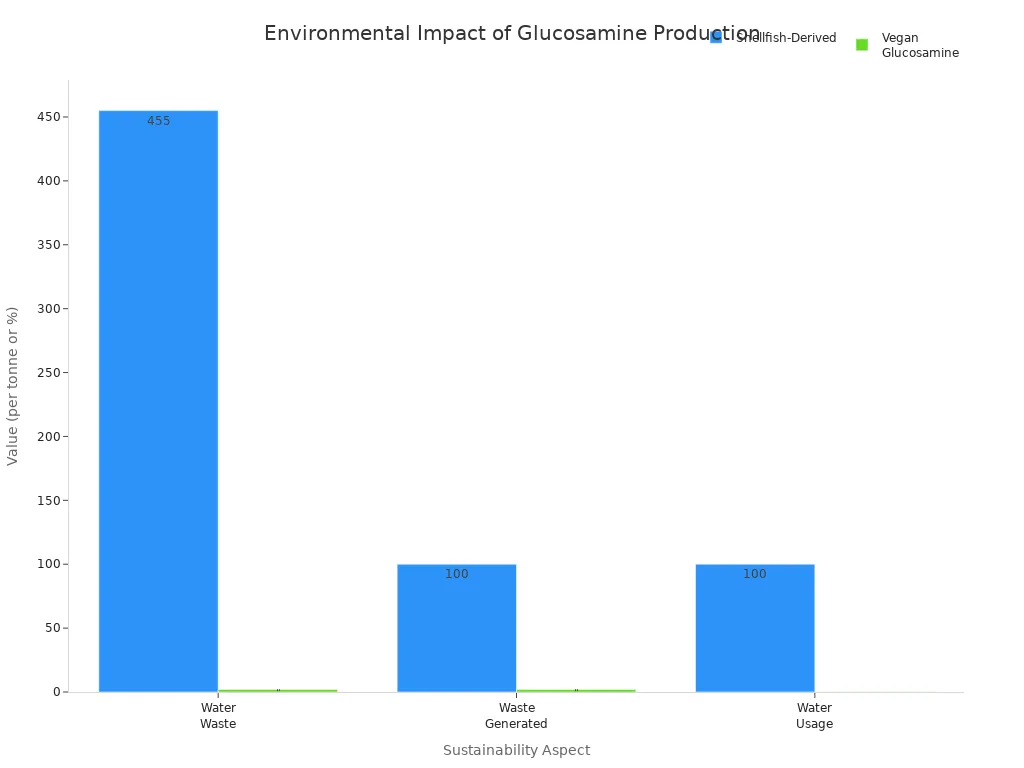Vegan Glucosamine Supplements and Joint Health Explained
Table of Contents

Recent clinical research shows that vegan glucosamine supplements may support joint health, especially for those managing osteoarthritis. Vegan glucosamine, made from corn fermentation, offers a plant-based option with sustainability and reduced allergy risk. Studies suggest equivalence in effectiveness between vegan and shellfish-derived glucosamine, but more rigorous clinical research is still needed. People with shellfish allergies or dietary restrictions often choose vegan glucosamine as a supplement. Many prefer plant-based options for both safety and ethical reasons.
- Vegan glucosamine supplements provide an alternative for those seeking non-animal sources.
- Clinical studies recommend up to 1500 mg daily for joint health, aligning with traditional supplements.
Vegan Glucosamine and Joint Health

How Glucosamine Supports Joints
Glucosamine plays a vital role in joint health. Scientists have found that glucosamine acts as a building block for glycosaminoglycans, which help form and repair cartilage. Cartilage cushions the ends of bones and allows joints to move smoothly. When people age, their bodies may produce less glucosamine, which can lead to cartilage breakdown and joint pain.
- Glucosamine helps the body make proteoglycans like aggrecans. These molecules keep cartilage strong and hydrated.
- Research shows that glucosamine can block certain inflammatory chemicals, such as interleukin-1 beta and NF-κB p65. This action may reduce swelling and pain in joints.
- Pharmacokinetic studies reveal that glucosamine is absorbed and reaches joint tissues, but getting enough into the joints can be difficult with standard doses.
Note: Clinical guidelines from groups like OARSI and EULAR recommend glucosamine sulfate for osteoarthritis. However, other organizations, such as the American College of Rheumatology, do not support its use. This difference highlights the need for more research on glucosamine’s efficacy.
Glucosamine supplementation has become popular for those seeking to maintain joint health. Vegan glucosamine, made from corn fermentation, offers a plant-based alternative. Some people choose vegan glucosamine because of allergies or ethical concerns. Although vegan glucosamine supports cartilage maintenance, clinical studies on its effectiveness remain limited.
Benefits for Mobility and Comfort
Many people use glucosamine to improve joint mobility and comfort. Clinical research has tested vegan glucosamine in combination with other ingredients, such as Boswellia Serrata and MSM. A 2021 study found that plant-based glucosamine with Boswellia Serrata helped people with mild to moderate knee osteoarthritis. Participants reported less pain and better movement.
- Glucosamine combined with MSM may reduce joint stiffness and chronic joint pain.
- Vegan glucosamine hydrochloride has shown benefits for gut health, which may indirectly support joint health.
Clinical studies show mixed results. Some trials report that glucosamine sulfate improves pain and joint function, while others find no difference compared to placebo. Meta-analyses suggest that industry sponsorship can affect outcomes. Most experts agree that more research is needed to confirm the efficacy of vegan glucosamine for joint health.
| Type of Glucosamine | Source | Main Benefit | Research Support |
|---|---|---|---|
| Sulfate | Shellfish, Vegan | Symptom relief, cartilage | Strong |
| Hydrochloride | Shellfish, Vegan | Gut health, less support | Limited |
Vegan glucosamine offers advantages such as sustainability and reduced allergy risk. People with shellfish allergies or dietary restrictions often prefer vegan glucosamine. While glucosamine for joint health remains a popular choice, ongoing research will help clarify its role in managing osteoarthritis and improving joint comfort.
What Is Glucosamine?
Role in Cartilage and Joint Function
Glucosamine is a natural compound found in the body. It plays a key role in building and maintaining healthy cartilage. Cartilage acts as a cushion between bones in each joint. When people move, cartilage helps the bones glide smoothly and prevents pain. As people age, their bodies may produce less glucosamine, which can lead to cartilage breakdown and joint discomfort.
Researchers have studied how glucosamine supports joint health. They found that glucosamine helps the body make important parts of cartilage, such as aggrecan and collagen type II. These molecules keep cartilage strong and flexible. Glucosamine also boosts the production of hyaluronic acid in the fluid around joints. This fluid keeps joints lubricated and moving easily.
Scientists discovered that glucosamine protects cartilage in several ways:
- Glucosamine increases the production of cartilage matrix components like aggrecan and collagen type II.
- It raises hyaluronic acid levels in the fluid that surrounds joints.
- Glucosamine prevents damage to collagen by stopping harmful oxidation.
- It blocks enzymes that break down cartilage, such as matrix metalloproteinases and aggrecanases.
- Glucosamine reduces inflammation that can harm cartilage.
These actions help maintain healthy joints and may slow down joint problems like osteoarthritis.
Forms and Sources
Glucosamine comes in several forms. The most common types are glucosamine sulfate, glucosamine hydrochloride, and N-acetylglucosamine. Glucosamine sulfate is often used for joint health and is considered effective for osteoarthritis. Most glucosamine supplements come from shellfish shells. However, some people cannot use shellfish products because of allergies or dietary choices.
Vegan glucosamine offers an alternative. Manufacturers can make glucosamine from corn fermentation or use glucosamine derived from fungus. These plant-based sources provide the same benefits as traditional glucosamine. Glucosamine is not found in foods, so people must take it as a supplement. Many supplements combine glucosamine with other ingredients like chondroitin sulfate or MSM to support joint health.
Tip: Always check the label to see the source and form of glucosamine in a supplement.
Vegan vs. Shellfish Glucosamine

Source Differences
Glucosamine comes from two main sources. Shellfish-derived glucosamine is made by extracting chitin from the shells of crustaceans such as shrimp, crab, lobster, and prawn. This process uses acid and alkaline chemicals, which creates toxic wastewater and landfill waste. Most shellfish glucosamine comes from Asian seafood processing plants, which can cause environmental pollution.
Vegan glucosamine uses a different method. Manufacturers produce it by fermenting glucose from non-GMO corn or fungi like Aspergillus niger. This process uses much less water and generates very little waste. Some brands, such as GlucosaGreen® and GreenGrown®, use patented technology to guarantee the vegetable origin of their glucosamine. These products are often certified non-GMO, kosher, and suitable for vegan diets.
- Shellfish-derived glucosamine comes from crustacean shells.
- The extraction process uses harsh chemicals and creates pollution.
- Vegan glucosamine is made by fermenting non-GMO corn or fungi.
- The vegan process is cleaner, uses less water, and produces less waste.
- Vegan glucosamine avoids shellfish allergens and fits vegan and vegetarian diets.
- Some vegan glucosamine brands use special testing to prove their plant-based source.
The table below shows how vegan glucosamine production compares to shellfish-derived methods:
| Sustainability Aspect | Shellfish-Derived Glucosamine | Vegan Glucosamine (GlucosaGreen®) | Environmental Benefit |
|---|---|---|---|
| Water Waste (tonnes per tonne) | 455 | 2 | 99.6% reduction |
| Waste Generated | 100% | 2% | 98% reduction |
| Water Usage | 100% | 0.1% | 99.9% less water used |
| Use of Toxic Chemicals | Yes | No | Eliminated |
| Impact on Oceans and Sea Life | Damage caused | None | Avoided |
| Risk of Shellfish Allergens | Present | None | Eliminated |
| Traceability | Not specified | Fully traceable | Improved |

Effectiveness Comparison
Many people want to know if vegan glucosamine works as well as shellfish-derived glucosamine. Clinical research and reviews, such as the EverJoint Review 2025, describe GlucosaGreen® as a plant-based glucosamine with excellent absorption. This form supports cartilage health and joint fluid, making it a good choice for people with shellfish allergies or those who follow a vegan diet.
Clinical studies show that both vegan and shellfish-derived glucosamine can help maintain joint health. Most studies focus on glucosamine sulfate, which is effective for osteoarthritis symptoms. The efficacy and safety of vegan glucosamine match those of traditional sources, according to current research. However, direct clinical trial data comparing the two sources remain limited. One study found that vegan glucosamine, when combined with other ingredients, improved joint comfort and mobility.
Note: Both vegan and shellfish-derived glucosamine support joint health. The main difference lies in the source and environmental impact, not in clinical outcomes.
Safety and Allergy Risk
Safety is important when choosing a supplement. Shellfish allergies affect about 2% of people. These allergies can cause mild irritation or severe reactions like anaphylaxis. Even though most allergenic proteins are removed during processing, doctors recommend that people with shellfish allergies avoid shellfish-derived glucosamine.
Vegan glucosamine does not contain any shellfish allergens. It comes from plants like fermented corn or mushrooms. This makes vegan glucosamine a safer choice for people with shellfish allergies or those who follow vegetarian or vegan diets. Both types of glucosamine can support joint health, but vegan glucosamine offers extra safety for sensitive groups.
- Shellfish-derived glucosamine may cause allergic reactions in some people.
- Vegan glucosamine poses no risk for those with shellfish allergies.
- Vegan glucosamine is suitable for people with dietary restrictions.
- Both forms show similar efficacy in clinical studies, but vegan glucosamine is safer for allergy-prone individuals.
Tip: People with shellfish allergies or strict dietary needs should choose vegan glucosamine for better safety and peace of mind.
Advantages of Vegan Glucosamine Supplements
Plant-Based Benefits
Vegan glucosamine supplements offer several unique benefits. These supplements come from non-GMO corn fermentation or fungi, not from shellfish. Many people choose vegan glucosamine because it supports joint health and matches the effectiveness of traditional glucosamine. Studies show that vegan glucosamine can:
- Reduce joint pain and stiffness.
- Improve physical function in people with osteoarthritis.
- Support cartilage by providing building blocks for glycosaminoglycans.
- Act as a natural anti-inflammatory in some cases.
- Avoid shellfish allergens, making it safe for those with allergies.
- Offer environmentally sustainable production with less water use and waste.
- Provide possible gut health benefits, such as reduced bloating.
Vegan glucosamine works as a plant-based supplement that helps manage osteoarthritis symptoms and supports joint comfort. Some studies also suggest benefits for people with temporomandibular joint arthritis.
Suitability for Vegans and Vegetarians
Vegan glucosamine fits the needs of vegans and vegetarians. Manufacturers use plant sources like non-GMO corn, soybeans, avocado, and fungi. These supplements do not contain animal ingredients or shellfish. Many vegan glucosamine products carry registration from the Vegan Society, which confirms their suitability.
- Vegan glucosamine is free from common allergens and additives.
- It avoids environmental toxins sometimes found in animal-derived supplements.
- Studies confirm that vegan and vegetarian glucosamine reduce joint pain and inflammation.
- These supplements help repair cartilage and improve mobility.
- Vegan glucosamine is a safe and animal-friendly choice for people with dietary restrictions.
Lower Side Effect Risk
Glucosamine has a strong safety profile. Clinical trials, including long-term studies, show no significant adverse effects for any form of glucosamine. Vegan glucosamine does not increase side effect risk compared to shellfish-derived glucosamine. Most people tolerate up to 1500 mg daily without problems. Some may notice mild stomach discomfort or nausea, but these effects are rare.
A 2024 review highlights that vegan glucosamine offers lower allergenicity and possible gut health support. No studies report a higher risk of side effects for vegan or vegetarian glucosamine. People with shellfish allergies or sensitive stomachs often choose vegan glucosamine supplements for added peace of mind.
Choosing Vegan Glucosamine
Key Criteria
Selecting a high-quality glucosamine supplement helps support joint health. People should look for glucosamine sulfate, as this form has the most clinical support. Vegan glucosamine made from fermented corn or fungi ensures a plant-based source. Capsules offer accurate dosing and are easy to take. Most supplements provide 600 mg to 1500 mg daily, often split into smaller doses with meals for better absorption.
Key points to consider include:
- Choose glucosamine sulfate for the best results.
- Check for clear labeling about the vegan source, such as corn fermentation.
- Avoid supplements with synthetic fillers or unwanted additives.
- Look for third-party testing to confirm purity and potency.
- Prefer capsules for ease of use and accurate dosing.
- Consult a healthcare professional before starting glucosamine supplementation, especially if you have health conditions.
| Key Criteria | Explanation |
|---|---|
| Source Transparency | Glucosamine from fermented corn ensures vegan origin and clear labeling |
| Clinically Supported Form | Glucosamine sulfate is the most studied and effective form |
| Transparent Dosage | Look for clear dosage, ideally around 1500 mg daily |
| Synergistic Ingredients | MSM, Boswellia, curcumin, and magnesium can enhance joint support |
| Third-Party Testing | Confirms supplement purity and potency |
| Avoid Synthetic Fillers | Reduces risk of unwanted side effects |
| Supplement Form | Capsules are preferred for dosing and tolerance |
| Certifications and Labels | Independent certifications indicate safety and quality |
Complementary Ingredients
Many glucosamine supplements include other ingredients to boost joint health. MSM (methylsulfonylmethane) supports cartilage and joint cushioning. Boswellia extract and turmeric help reduce inflammation. Plant-based chondroitin, such as Phytodroitin, works with glucosamine to support cartilage. Calcium L-aspartate helps maintain bone density. Aloe vera provides antioxidants for joint wellbeing.
- MSM, Boswellia, turmeric, and magnesium work together with glucosamine for better results.
- Vegetarian chondroitin and glucosamine from non-animal sources avoid allergy risks.
- Consistent use of these combinations can improve joint comfort and mobility over time.
Label and Certification Tips
Reading supplement labels helps ensure purity and vegan status. Look for allergen labeling that confirms the absence of crustaceans. The Vegan Society’s Vegan Trademark shows the supplement contains no animal ingredients or testing. Organic certification, such as the Soil Association logo, supports claims of purity. Supplier documentation can also confirm vegan status.
| Certification / Label | Description | Purpose for Consumers |
|---|---|---|
| Allergen Labeling | States absence of crustaceans | Ensures no shellfish-derived glucosamine |
| Vegan Society’s Vegan Trademark | Confirms no animal ingredients or testing | Guarantees vegan status |
| Soil Association Organic Certification | Shows organic status and quality assurance | Supports purity claims |
| Supplier Documentation | Verifies vegan status from the supplier | Adds assurance for vegan consumers |
Tip: Always check for clear labeling and trusted certifications before choosing a glucosamine supplement.
Vegetarian Glucosamine for Athletes
Mobility and Recovery
Athletes often look for ways to protect their joints and speed up recovery after exercise. Vegetarian glucosamine offers a plant-based option that supports these goals. This supplement comes from corn fermentation, making it suitable for people with shellfish allergies or those who follow a vegetarian lifestyle. Many athletes experience joint stress from running, jumping, or lifting weights. Vegetarian glucosamine helps maintain healthy cartilage, which cushions the bones and allows smooth movement.
Clinical studies show that glucosamine can modestly improve symptoms of osteoarthritis and slow cartilage breakdown. This benefit is important for athletes who want to stay active and avoid joint pain. Some research suggests that vegetarian glucosamine may also support gut health, which can help with overall recovery and well-being. When athletes combine vegetarian glucosamine with other supplements like MSM, Boswellia Serrata, or turmeric, they may see even better results for joint comfort and reduced inflammation.
Tip: Many sports nutritionists recommend up to 1500 mg of vegetarian glucosamine daily for safe, long-term use.
Active Lifestyle Support
People who lead active lives need strong joints to keep moving without discomfort. Vegetarian glucosamine provides a sustainable and ethical way to support joint health. It works by giving the body the building blocks needed to repair cartilage and keep joints flexible. This is especially helpful for athletes, dancers, and anyone who enjoys regular physical activity.
Vegetarian glucosamine stands out for several reasons:
- It comes from plant sources, not shellfish.
- It supports joint health and may slow cartilage wear.
- It fits vegan and vegetarian diets.
- It can be combined with other joint-supporting ingredients like chondroitin, collagen, and MSM.
- It is considered safe for long-term use at recommended dosages.
Although research on vegetarian glucosamine is still growing, current evidence shows it is a promising choice for joint support in active individuals. Athletes who use vegetarian glucosamine often report less joint stiffness and better mobility, helping them stay on track with their training and daily routines.
Vegan glucosamine supplements support joint health for many people, including those with shellfish allergies or plant-based diets. Studies show that vegan and shellfish-derived glucosamine offer similar benefits for osteoarthritis relief. Experts recommend choosing glucosamine sulfate, with a daily dose up to 1500 mg. Users may combine glucosamine with MSM, Boswellia, or turmeric for extra support. People should check labels for plant-based sources and consult a healthcare provider before starting any supplement.
FAQ
What makes vegan glucosamine different from regular glucosamine?
Vegan glucosamine comes from fermented corn or fungi. Regular glucosamine usually comes from shellfish shells. Vegan glucosamine does not contain animal products or shellfish allergens. It offers a safe choice for people with allergies or plant-based diets.
Can children or teens take vegan glucosamine supplements?
Doctors recommend that children or teens use glucosamine only under medical supervision. Most studies focus on adults. Parents should talk to a healthcare provider before giving any supplement to young people.
How long does it take to notice results from vegan glucosamine?
Most people notice changes in joint comfort after four to eight weeks. Results may vary. Consistent daily use helps support joint health. Some may feel benefits sooner, while others may need more time.
Are there any side effects with vegan glucosamine?
Vegan glucosamine is safe for most people. Mild stomach upset or nausea can occur in rare cases. People with health conditions should check with a doctor before starting any new supplement.
Can vegan glucosamine be taken with other joint supplements?
Yes, many people combine vegan glucosamine with MSM, Boswellia, or turmeric. These combinations may offer extra support for joint comfort. Always read labels and consult a healthcare provider for the best advice.

Poseidon
Master of Nutritional Epidemiology, University of Copenhagen, Herbal Functional Nutrition Researcher
Focus: The scientific application of natural active ingredients such as Tongo Ali, Horny Goat Weed, and Maca to sexual health and metabolic regulation.
Core Focus:
Men: Use a combination of Tongo Ali (an energizing factor) + Maca (an energy reserve) to improve low energy and fluctuating libido.
Women: Use a combination of Horny Goat Weed (a gentle regulator) + Maca (a nutritional synergist) to alleviate low libido and hormonal imbalances.
Stressed/Middle-Aged Adults: This triple-ingredient synergy supports metabolism, physical strength, and intimacy.
Product Concept:
Based on traditional applications and modern research (e.g., Tongo Ali promotes testosterone-enhancing enzyme activity, and icariin provides gentle regulation), we preserve core active ingredients and eschew conceptual packaging—using natural ingredients to address specific needs.
Simply put: I'm a nutritionist who understands "herbal actives." I use scientifically proven ingredients like Tongo Ali, Epimedium, and Maca to help you make "sexual health" and "nutritional support" a daily routine.
